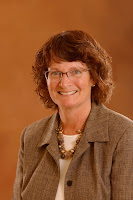by Bryan Whitledge
Since Christa Clare joined the Clarke Historical Library, a lot has changed: the Clarke moved from the fourth floor of the Park Library to the first floor with a (not so) brief layover at Rose Arena, dozens of staff members as well as members of the Clarke’s governing board have come and gone, hundreds of students have earned some extra money working part-time in the Clarke, thousands of books and records have been acquired, and tens of thousands of researchers have made use of the library. Through all of the changes, Christa has been central to the success and excellence of the Clarke.

A good many of the Clarke’s regular visitors and supporters would count Christa as a friend. Her warm smile and genuine kindness have been available to everyone who has walked through the doors—attendees of speaker series events, CMU employees coming into the library on business, Clarke board members coming for the semiannual meeting, donors dropping off materials to add to the collections, new student employees on their first day, and more. Countless relationships with donors, benefactors, and supporters have started with Christa’s friendly, “Hi, how are you today?” offered to anyone who has walked into the Clarke. It is no overstatement to say that there has been no better person to welcome visitors, to converse with people about anything and everything they wished to talk about, and to make everyone feel like the Clarke was an excellent place that would take care of history and make it available to everyone.
For the staff, Christa has meant more to our success than she will ever know. As with many offices and workplaces, most people have little idea all of the little cogs, widgets, and levers that are needed to make the Clarke machine move. Christa has been relied upon to keep the machine running by handling a multitude of behind-the-scenes tasks. Because it would be impossible to list all of her contributions, we have offered up a very small sampling of all that she has provided and has helped with during her time at the Clarke (in no particular order):

gathering, sorting, and keeping track of all sorts of financial reports, helping hire students, purchasing new books, purchasing old books (but new to us), tracking acquisitions, creating lists of donors, providing the address of an old colleague, covering the reading room when we are short-staffed, purchasing supplies, processing payments, adding bibliographic information to the catalog entries, making sure student staff get paid, reporting broken… everything—lights that won’t turn on, copy machines that won’t act right, HVAC systems that are too hot or too cold, phone lines that won’t operate, etc., managing our memberships in dozens of historical organizations, arranging for catering, giving us a band-aid in the all-too-frequent event of a paper cut, and being a sympathetic ear and a friendly conversationalist.
We’ve counted on her to relay our messages that we would be absent. And we’ve all come to expect that she will wish us well and hope we feel better before she hangs up the phone.
Getting the job done is great, but Christa takes it one step further—she infused her personality, compassion, and zest for life in the Clarke’s work culture. Every staff member, including every single student employee, has received a birthday card signed by the entire staff each year… and if a person’s birthday falls during the winter break or when a student is away during the summer, you can bet that Christa will put a stamp on it and make sure the birthday celebrant gets their card. Not as joyous, but possibly more meaningful, she also has made sure that sympathy cards were circulated for a colleague who suffered a loss or illness. These small gestures have gone a long way to make staff members feel welcome and valued.
When it comes to a making the most of life, Christa walks the walk. It has not been unusual to come to work in the morning and see a container of cookies awaiting the students—why? Because Christa woke up and thought fresh homemade cookies would brighten our day. She has shared the bounty of her garden with the staff because, why not? When she feels like fresh flowers will spruce up her space, she brings in fresh flowers. And for those who say they don’t have a green thumb, Christa never gives up on the aspiring horticulturalist and continues to bring in cuttings and shoots and offers some helpful advice.
 |
The Clarke staff as "Scrabble" for Halloween, 2012
|
Everyone has shared a laugh with her, and a lot of those laughs start with ideas for social events. The Clarke’s Halloween costumes at the annual staff potluck were second-to-none… for a long time, at least… and she was always the ring-leader master-minding the whole operation. You can guess who wiped away the competition in the winter ugly sweater contest. And you know who has been behind-the-scenes making sure there were plenty of chairs, napkins, cups, and, most importantly, good attitudes at a barbecue for graduating students. Just when the winter doldrums were really settling in for everyone and she could tell, Christa would suggest that the staff hold a tea exchange and tea party to lighten our spirits. It was just what we needed.
Similar to how one book or one box of records is only a sliver of everything that the Clarke holds about Michigan history, this is merely a sliver of how meaningful Christa has been to Clarke and to the lives of the staff members. We wish her the absolute best in her retirement.







